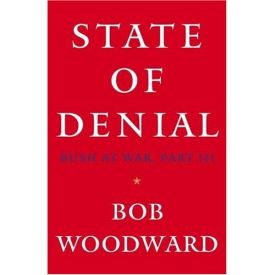A New Era in Scandalology
From The New Criterion“Stories that couldn’t be more different — Bob Woodward’s new book and the Mark Foley sex scandal — are examples of the difference between get-it-in-the-paper-now journalism and how- did-it-really-happen journalism.” Or so wrote Deborah Howell, ombudsman of the Washington Post, last month. “Readers questioned both,” she added. In fact, the two stories were practically the same, since both were non-events that the Post, for whatever reason, was trying to blow up into scandals. What Mr Woodward’s book, or at least the publicity surrounding it, boiled down to was the less-than earth-shaking revelation that Presidents receive conflicting advice and intelligence in advance of almost every decision they make and that, therefore, no matter what they do, someone’s advice and intelligence will have been rejected. The rest was hype. Because the decisions President Bush made about going to war in Iraq look in retrospect like bad ones, all the would-be scandal-monger has to do is to go back and find the rejected advice — and there is never any shortage of those wishing to be wise after the event who are prepared to claim it as their own — and suggest by repetition and by the detail with which it is re-created that it was so obviously the right advice at the time that it amounts to a scandal for the President to have rejected it.
The problem for Mr Woodward in trying to sell his scandal was that we know, if we think about it at all, that this cannot be true. If it were, nothing like the number of Democrats who voted to give the President the authority to go to war in Iraq would have done so. Whether they really thought the invasion was a good idea or they were only afraid that their votes against it would be held against them if it turned out to have been one, they shared in the President’s mistake — if it was a mistake, as most Americans now seem to believe it was — which powerfully suggests that it was an honest one and therefore no scandal at all. Moreover, any book written about historical events while those events are still in progress is bound to lack perspective and to become the vehicle for score-settling and self-justification among bureaucrats seeking to cover their, um, tracks. It is obvious to the reader of his new book, State of Denial, that every one of Mr Woodward’s interviewees must have had some other purpose in agreeing to be interviewed than a disinterested concern for the truth. And why should we suppose that he himself is the only character in the book without an axe to grind?
The Woodward method is to assume that if you amass enough detail and cross-check and compare one story with another the biases will cancel each other out, but what this really means is that he is saying, trust me, Bob Woodward, to figure it all out for you. That’s what he said the last two times, too, when his research threw up very different results. State of Denial bills itself as Bush at War, Part III, but Bush at War Part I (2002), painted a much more favorable picture of the Bush administration and Part II, Plan of Attack (2004), though more critical, was also more positive overall. Now that the public mood has turned so strongly against the war and the President, he has produced a highly critical book using exactly the same methods. Are we to suppose that it is merely coincidental that the graph of public opinion tracks so exactly with Mr Woodward’s evolving views? Are we to think that there was no consideration given to telling the public what it wanted to hear, or that it never occurred to the journalistic hero of Watergate that it might be good for business if he were to unearth, after all that digging, another scandal — published just in time for the mid-term elections — with the potential to alter the political landscape in America? Call me a cynic, but that’s just a little too much for me to swallow.
Luckily for me, perhaps, no one will care very much about my skepticism. For the lesson of the Foley scandal was that we have arrived at a new era in scandalology: that is, at the point where it has become scandalous even to suggest that avoiding a scandal is a desirable thing. The cry of scandal is itself enough to create the presumption of guilt, and the burden of proof then shifts onto the hapless victim of the media’s pursuit to show, like the President, that he acted in good faith or, like Congressman Foley, that his behavior had been, at least, not criminal — and private. So far as anyone knew at the time he was forced to resign, it had been merely indiscreet. In retrospect, and with the discovery of more sexually explicit communications, resignation turned out to have been the right course, but this could have been effected discreetly if the media had not seen it as their duty to get involved. And anyway, the whole scandal as it spread beyond the immediate circle of the congressman depended on the Republican leadership’s failure to treat a hint of indiscretion like a criminal act. Even in the explicit e-mails there had been no criminality; no harm had come to a single one of the congressional pages who were supposedly Mr Foley’s victims. Politics aside, the number of those morally or materially harmed by the publication of the congressman’s e-mails and instant messages — that is, the congressman himself and his family, staff, colleagues and friends — so far exceeded the number of those harmed by those things themselves — that is, zero — that a na ve person might have thought that even the media, even a political opposition apparently willing to seize on anything that might bring discredit on its enemies, could see the unwisdom of publication.
Don’t make me laugh! Not only was there, apparently, no case for handling the matter quietly and without a public fuss, but suggesting that there might be one was itself the stuff of scandal. It took no more than the fact that Speaker Dennis Hastert had known about one of the congressman’s e-mails — not the ones in which there was explicit sex talk but the one in which he had inquired after the health and safety of a young page who was in Louisiana at the time of Hurricane Katrina and had asked the youth to send him a photo — to embroil him in the scandal. The fact that he had not immediately gone public with what he knew (a suspicion at best) before the media could rush it into print was enough to move the “conservative” Washington Times to call for his resignation. In all the coverage of the Foley affair I saw, there was not a paragraph, not a line, not a word to suggest that there might have been even a prima facie obligation of loyalty among party colleagues — not even so much as it would take to dismiss such an obligation as being of no weight in comparison with the enormity of the congressman’s offense. It was simply taken for granted everywhere that at the first hint of indiscretion, let alone wrong-doing, a loyal comrade in political arms should be cast to the media wolves and all his doings, and all the allegations against him, dragged into the public eye.
But if Speaker Hastert himself didn’t dare to make the case that there was anything defensible, let alone compelling, about refusing to destroy a friend and colleague on the dubious evidence of an e-mailed request for a photograph, why should anybody else? On the contrary, he implicitly recognized the justice of the calls for his head and the bloodthirstiness of the wolves howling at his door by offering to fire anyone on his staff who might prove to have been more clued-in than he was. Likewise, the President’s press spokesman, Tony Snow, had to apologize for saying “It’s not always pretty up there on Capitol Hill, and there have been other scandals, as you know, that have been more than simply naughty e-mails.” Until he did, perhaps for the space of one news cycle, those words — and especially the word “naughty” — became the scandal. According to The New York Times, Democrats “said his words suggested that Republicans did not understand the gravity of the situation.”
Golly! If there’s anything you don’t want to be caught doing when the media are engaged in what a former president once called “the politics of personal destruction” it’s failing to understand the gravity of the situation. If you are, it means that you can get destroyed too. Accordingly, Mr Snow made his obeisance to the media hysteria by confessing: “I shouldn’t have used the words” — though with the stipulation that “I did six interviews that morning and people picked on one-half of one line.” It was a mere slip of the tongue! Honest! When the swirl of indignation then passed him by, he must have felt a bit like Cinna the poet in Julius Caesar if his claim of mistaken identity had been accepted by his murderous fellow-citizens. Like Mr Hastert, he had been brushed by the wing of the angel of political death. And if these two gentlemen had been so intimidated, small wonder that the congressman himself never bothered to defend himself. Instead, citing childhood sexual abuse and alcoholism, he laid his feeble claim to the sympathy (usually) due to victimhood rather than trying to reason with a hostile mob.
And it was really the hostility of the mob that was at issue here, a fact which the Washington Post’s ombudsman not surprisingly chose to ignore in concluding that the behavior of the paper in the matters both of the Foley scandal and of Bob Woodward’s book had been entirely correct. “On the Foley story,” she wrote, “readers questioned whether Post staffers want Republicans to lose control of Congress.” Quelle idée! We have the Post’s own word for it that its reporters “would have pursued [the scandal] just as diligently if the Democrats controlled Congress.” Let’s give her the benefit of the doubt here and presume that she didn’t intend to leave the ambiguity in this assertion, since the questioning readers must really have been making the charge that the Post was doing its best to help the Democrats, whoever happened to be in the majority at the moment. Let’s assume that it is this charge that she is denying, then, when she writes: “Whatever private political views reporters may hold, a big breaking story trumps everything. Remember how vigorously The Post covered the Clinton-Lewinsky saga?”
I do indeed! I also remember how much of that coverage was devoted to criticism — some of it entirely justified, in my view — of the manner and motivation of Kenneth Starr’s investigation of President Clinton. Where was, in the Foley case, the corresponding criticism of those with the most to gain from that scandal? I don’t remember a word of it. You couldn’t get the width of a sheet of newsprint between the position of the Democrats and that of the media, who were both in full cry after Representative Foley and such of his fellow Republicans as might, if looked at in just the right way, conceivably have been guilty of that greatest and most gratifying of all scandals, a “cover-up” of their colleague’s misbehavior. I’m old enough to remember when most people, maybe even most people in the media and certainly most people in politics, were wise enough to know that some things were better covered-up, but no one dared to say so in the Foley affair. That was what was most remarkable about it. As apparently the sole remaining believer that scandal is not always good for us, and therefore in covering some things up, I must suppose that it is only my obscurity which prevents the mob from turning on me.
Of course, we can agree with Ms Howell that “a big breaking story trumps everything,” but she neglects to mention the extent to which it is the Post itself and other media behemoths who get to decide what a big breaking story is, and how it is to be covered. If these decisions were what some few of the Post’s readers were questioning — as they had earlier questioned the paper’s making a big breaking story out of Senator George Allen’s use of the word “macaca” or his discovery of a Jewish grandparent — we get no hint of it from Ms Howell. The Media Research Center of Alexandria, Virginia did a calculation of the number of stories about the congressman aired by the big three networks in the first 12 days of the scandal — 152 — and compared it to the number they ran from the time the story of Democratic Congressman Mel Reynolds broke in 1994 until he went to jail over a year later for sexual relations with an underage girl. That number was 19. Of course in Congressman Foley’s case, you had the added frisson that he belonged to the party that purported to champion family values, but such an immense disparity, particularly when there wasn’t any suggestion of criminal behavior in the Foley case, might suggest to some a political motivation.
Likewise, The New York Times’s ponderous moral and editorial earnestness (see below) about Mr Foley’s sins contrasted oddly with the following paragraph from its obituary of former Democratic Representative Gerry Studds, who fortuitously died as the Foley scandal was at its height: “His homosexuality was revealed through scandal. In 1983, he was censured by the House for having had an affair 10 years earlier with a 17-year-old Congressional page. For Mr. Studds, formal and dignified, a model of old New England reserve, the discovery sparked intense anguish, friends said.” An affair with a 17 year old page? I suppose that the “formal and dignified” Mr Studds and his “old New England reserve” could expect no less from the Times, but I don’t remember any solicitude for what could hardly have been the less intense anguish of Republican Mark Foley, though he had never touched a page, let alone subjected one to an “affair.”
All this makes rather unpersuasive the ombudsman’s recourse to the familiar media dodge — something that has now risen to the level of that rare thing, an untrue cliché — that non-partisan scandal-mongering (even if it were non-partisan, which it isn’t) is proof of a larger non-partisanship on the part of those who bring us the news. According to the estimate of Thomas Edsall, a recently-retired political reporter on the Post and a liberal Democrat himself who spoke with the conservative radio host, Hugh Hewitt, the sympathies of political reporters are Democratic in a ratio of somewhere between 15 and 25 to 1 over Republican, yet this can be dismissed as being of no relevance to their coverage of politics. That must surely be as disingenuous a claim as that their coverage of the Foley e-mails was uninfluenced by their wish to see a Democratic House of Representatives — or that all the free publicity the Post has given to Mr Woodward’s book is completely disinterested and in the public interest because of the historic nature of his revelations.
Funny, isn’t it, how history seems to vote Democratic? Thus, too, The New York Times solemnly editorialized,
History suggests that once a political party achieves sweeping power, it will only be a matter of time before the power becomes the entire point. Policy, ideology, ethics all gradually fall away, replaced by a political machine that exists to win elections and dispense the goodies that come as a result. The only surprise in Washington now is that the Congressional Republicans managed to reach that point of decayed purpose so thoroughly, so fast. That House leaders knew Representative Mark Foley had been sending inappropriate e-mail to Capitol pages and did little about it is terrible. It is also the latest in a long, depressing pattern: When there is a choice between the right thing to do and the easiest route to perpetuation of power, top Republicans always pick wrong.
Not that the Democrats or The New York Times have any interest at stake in ending that “perpetuation of power”! Not that the terribleness of inappropriate e-mails could have at least as much to do with the politically opposed eye of the beholder as it did with the alleged corruption of the Republicans. As Jake Tapper of ABC, the network that did the most to bring the scandal front and center in the middle of an election campaign, put it: “This is the scandal that will not go away.” Not that he could have had anything to do with making sure that it didn’t go away!
But let’s say that we swallow our cynicism and accept that the scandal hype was not solely motivated by the desire of a pack of Democrats to help their fellow Democrats to win an election — or even by the other possibly self-interested motive, namely that of the media to sell more newspapers or more advertising on their newscasts. Perhaps they were hyping these pseudo-scandals for no better reason than that that was what journalists do, or at least what they do in the present age of scandal. Increasingly, it’s what politicians themselves do. Purged of any ideological or philosophical content, any reasoned principles on which one or another of the miscellaneous grab bag of policies they have to offer us might be based, our public men and women have lately developed the media’s own taste for blood and concentrated on potential scandal in their political opposite numbers to the exclusion of (almost) all else. This is what Fred Barnes in The Weekly Standard has called “criminalizing politics.”
As John F. Harris in a moment of unguarded candor wrote in the Post about the Foley and Allen scandals, and former President Clinton’s verbal attack on an interviewer for Fox news, “Cumulatively, the stories highlight a new brand of politics in which nearly any revelation in the news becomes a weapon or shield in the daily partisan wars, and the aim of candidates and their operatives is not so much to win an argument as to brand opponents as fundamentally unfit.” Thus, according to another report in the Post by Jim VandeHei — who, by the way, was the only political reporter Mr Edsall could think of in the Hewitt interview who might be Republican in his sympathies — the use that the Democrats got out of the Foley scandal went far beyond Florida’s 16th district, and even beyond the bizarre intimation that Republicans in general were soft on pedophilia and therefore unfit for government.
“Although Democrats’ internal polling shows that the Foley scandal is resonating deeply only in half a dozen races, party operatives are calculating that GOP candidates are now unusually vulnerable to personal attacks, several candidates and strategists” told Mr VandeHei. “Top Democratic officials believe ‘that anybody who had a personal vulnerability before this is totally [at risk] with the spotlight on scandal,’ said a Democratic aide familiar with the party’s plan to take advantage of the Foley affair. ‘Frankly, it is a tough environment out there if you have a problem with the bottle or the zipper’.” Other “top targets are Republican incumbents who have been bruised by the Abramoff scandal” — presumably since it is one of the iron laws of scandalology that a scandal anywhere contributes to the general sense of scandal everywhere. This multiplier effect allows one would-be scandal to be bundled with others — and all of them together with the one over-arching scandal that it had been Mr Woodward’s purpose to back. After all, if for three or four years now the political opposition in America has been defined by repeated claims that “Bush lied, people died,” even a stray gay congressman’s suggestive e-mail to a page could look to the Bush-haters’ scandal-haunted paranoid dream-world like a confirmation of all they have been saying.
Discover more from James Bowman
Subscribe to get the latest posts to your email.







